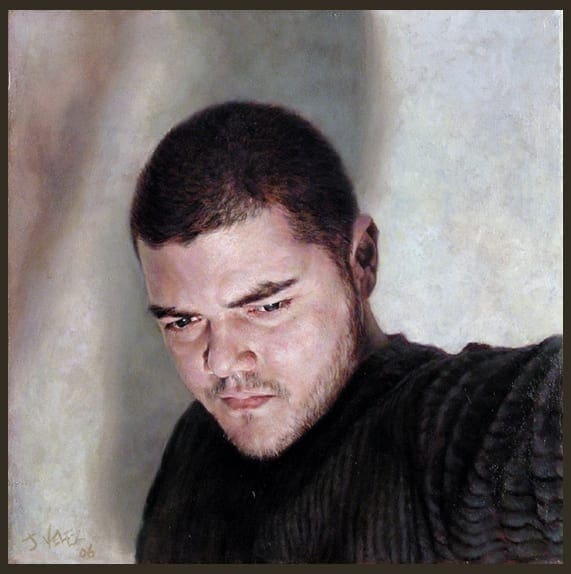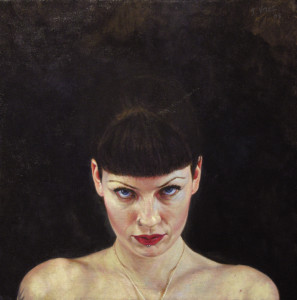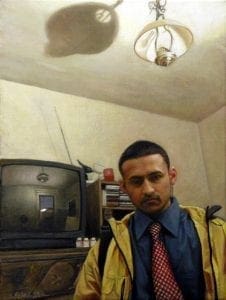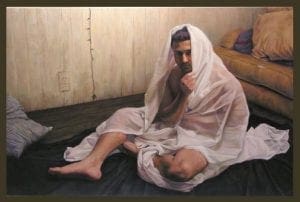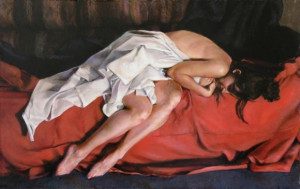Joe Velez on Painting and Being an Artist
I recently had the pleasure of speaking with very talented local painter Joe Velez. He told me about himself, his process, the art community, and what keeps him here.
When did you begin to paint and draw seriously?
JV: When I was 21. I’ve always liked drawing before that, like most kids. I was a little bit more into it, but not super into it. Never thought I would be an artist, you know, as a career path. I was playing music for a while, but I was really shy on stage, so it wasn’t for me to pursue music in that way.Painting just became the outlet that took over what that was for me. I just got encouraged. I think a few months into painting I was in a group show in Jersey City and it was a good response, so I kept on with it.
How did your work get noticed?
JV: By the person who owns that gallery…I think my father made me bring it in to show them, or something like that, don’t actually remember, but that person liked it and was very nice and encouraging and invited me to have work in a group show. I think it was six months later that I had a solo show at the City Hall in Jersey City. So it just happened fast. Just really encouraging and I just loved doing it, out of nowhere, it just suddenly became something that I had to do every day.
Is that how it’s done? If you want to get noticed by galleries, you just go there and show your portfolio?
JV: I know people that do that. I’m not very proactive with that. At this point, I just meet people and end up having a thing somewhere. I should be more proactive, distribute my work purposefully to galleries in the city, but I just don’t. (laughs) Some artists show up with actual work, which is a bad idea. Or with slides or pictures or a CD of images, but honestly, what I’m noticing the best way is to go to as many events as you can to meet people that way. It’s like if they’re comfortable with you as a person, they’re willing to listen to you and give you a chance. Or your work can be so good, you just blow them away. You show them and they’re like, “Well yea, I got to show this.” It can go both ways.
You are self taught. Have you ever sought instruction of any sort?
JV: When I was in high school I was accepted…and I wasn’t even that into art, but my art teacher in grammar school made me apply to this program, I don’t remember the name, but it was a program where we spent two hours a day at JCU—it used to be Jersey City State College at the time. So I got accepted into that, but it didn’t last too long. (laughs) They kicked me out because I was not attending very much at all, so that was the closest I got to getting art instruction.
Did you know you were good? Was it that it came so naturally to you that you didn’t think much of it?
JV: I mean, even when I wasn’t trying to be an artist I would try to do as best as I could each time. I would be into the idea of making it something I can be proud of. Even at the time I always pushed myself with the images I was making. I didn’t want to do it just to waste time.
So it was something you enjoyed but it was people outside yourself that pushed you to pursue it further.
JV: Yea, I think that’s important for anything. Especially for creative types, you need some motivation beyond yourself. Of course, you have to rely on yourself with this stuff, but something from the outside is very encouraging and helpful.
It’s validating.
JV: Yea and also, you need feedback in other ways too. To know when you’re not good, and to know when something sucks. It’s good to just have people respond in whatever way to what you’re doing.
What’s the best feedback you’ve received?
JV: That’s a trap question, you’re trying to make me compliment myself. (laughs)
It doesn’t have to be a compliment.
JV: There are some things that are more technical. In general though, the best feedback I’ve gotten is that people don’t feel that the images I make are forced. That it’s not coming across as some arbitrary image and I don’t feel like I paint just to paint. I paint for a reason, even if the image isn’t that directly related to it, there’s always something for me behind it. And the fact that people see that and don’t feel like, “Oh here’s a painting of a nude woman, it’s about a nude woman.” The fact that people generally seem to understand that there is more than that there, is hugely complimentary. It’s definitely validating. That’s a big deal. And I think the biggest compliment honestly is—and I guess this is teacher instinct that I’ve built—is that people are encouraged to produce more work or try to improve their work because of seeing my stuff. That’s a big deal, because for me, I look at other artists and that’s what motivates me. I look at old masters or more recent artists and go, “Wow, look at that little thing he did, that’s amazing, I want to get up to that.” So if somebody thinks of me in that way, it’s great.
Which artists have influenced and motivated you?
JV: When I first started I was hugely into Salvador Dali and Basquiat, and Picasso, more like…not abstract, but more expressive type of work. Then it grew to looking at older and older masters like Rembrandt and Vermeer. I would say that Dutch old masters have been a huge influence. And also spanish like Velasquez, Ribera, Goya. I’m actually going to the Met today. I’m meeting a friend there, and I haven’t gone in months, so I’m really looking forward to it.
Is there anything in general that inspires you to paint? You see something on the street or hear some music and things just click?
JV: It’s not really that direct for me. It’s a build up of things. Like the last two months, up until a couple of weeks ago, but the couple months before that I hardly painted at all. I was just working and honestly, going out a lot, (laughs) experiencing a lot of things. And I consider that necessary. Cause there are artist that paint everyday, but eventually, it’s like what are you painting? Either you’re going to paint your little world which is fine, I guess I paint my little world too, but eventually you’re just painting to paint, which I don’t like to do. So it’s more of a collection of experiences that I have which inform my work. And I guess there was a point where I felt it was getting stale, so I just stopped painting for a few months, and just wasting my money going out (laughs). But ultimately it was worth it because now I’m back in painting and it’s funny, when I take those little breaks, then come back to it, I feel like I’m much better than when I stopped. I feel like right now I’m painting much better than I’ve ever have in my life. And that’s directly after not painting for a couple of months.
What’s better about it do you think?
JV: Um. Well on a couple different levels. One, I feel it’s better technically because my eyes aren’t so tunnel vision about painting anymore. I can see a little better, like literally see better. Because I think when you stare at one thing or a group of things for a long time—like paintings I’m working for a long time, they take me months to do—you can’t really see it anymore, it just becomes routine. You come to this office everyday and you don’t notice certain things anymore cause you’re here every day but I’m seeing it fresh and it’s pretty cool. But that’s what it’s like with me painting. If I’m just painting every day, every day, every day for like a year, I just can’t, I can’t see it anymore. I’m in the habit of when I’m not working on something, I’ll turn it away, turn it towards a wall, so when I am working on it, I’m seeing it kind of fresh. But that’s still limited. So I had to take that couple months off. I feel better that I’m able to see more and translate what I’m seeing better. Also it’s a lot more emotional…trying to think of a better word than that.
Connected?
JV: Yea. There’s much more real emotional connection to what I’m painting than if I’m painting every day like it’s a job. I’m actually painting exactly what I want to paint, and I feel what I’m doing and know why I’m doing it. As opposed to just doing it because it’s time to paint something.
Your paintings are very detailed. Do you work off a picture or do you draw first and then work off that?
JV: There’s all kinds of ways because it depends.The models that I work with are volunteers. I probably shouldn’t say this, but I have something against paying models for my own work. I pay models for classes and stuff. My own work I wouldn’t do it because I don’t want any part of that to be a job. So if someone’s doing it for me then there’s a connection, but that also means their time is very limited so I can work from them for life for a while but of course they have a life to live and can’t sit there for a couple months. So I’ll take a photo, and use that from there. Sometimes they have no time at all and I’ll take a photo and use that completely.
You paint mostly portraiture and the human figure. I’m sure you can paint all kinds of things, but what is it about portraits and figures that you keep painting them?
JV: It’s hard to say. That’s just my subject, I’m interested in people and how they can express themselves. And how I can express ideas through somebody’s face or gesture as opposed to a landscape. People can express things through color for a landscape, but it’s not really natural to me. Even when I was a kid and I was just drawing for fun it would be faces or figures, it’s just very naturally ingrained in me.
Any exhibitions coming up?
JV: Yea I’m curating a show in August at a gallery in Jersey City and I’m going to put two new paintings in it that I’m working on now. And I may or may not be curating something after that. This one is in 313 Gallery in Jersey City which is a fairly new space and my friend Thomas who runs a Jersey City art school also runs that gallery. Should be pretty good, I’m getting a lot of artists from The City and Brooklyn which when I curate art shows, which I’ve done plenty of, I tend to bring outside people to this area to bolster the area a little bit and also to let local people and artists see art that’s like right there and it’s pretty amazing. Just like keep the cycle going back and forth.
When is this going to be?
JV: It’s in August. I really need to nail down the date. But it’s definitely in early August. [The exhibition will be on August 9th from 5-9 p.m. at 313 Gallery in Jersey City]
What keeps you in Jersey City?
JV: I like the proximity to New York. I also think, what keeps me around as far as being involved in the art community is that Hoboken and Jersey City is just so…I dunno, it’s just the character of the art and the artists. It’s just really super legitimate and everyone’s trying to make good work. I would say especially within Jersey City, there’s a tight community, as well as a large one of art related people like artists, musicians, writers and it’s really cool actually. I really enjoy that, being a part of it. And working within it and the fact that I feel on some level that my work is appreciated there. It’s not like my work isn’t appreciated elsewhere, I just really like the people, I really like the efforts they’re making. For example my friend Thomas who started the Jersey City Art School out of nothing and now he has studio spaces he rents and galleries and he’s doing very well. And there are other people like that, like my friend Summer, who’s a writer. She writes art columns, but also her own plays and stars in them and she’s expanding, she sings. It’s like everyone is improving themselves artistically.
About the Author/s
Writer/Blogger at The Digest. Lifelong New Jersey resident. Actually likes this place.
